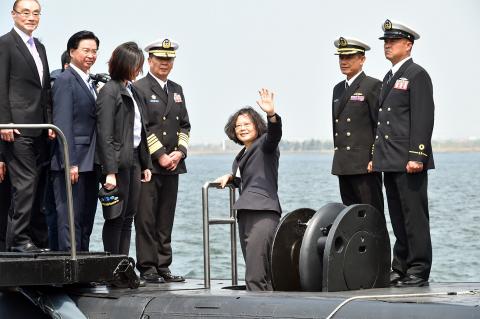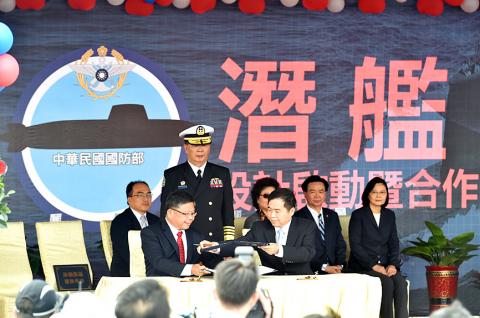The nation is hoping to build its first homegrown submarines within eight years and commission them into service within a decade, the shipbuilder tasked with carrying out the program said yesterday.
CSBC Corp, Taiwan (台灣國際造船) chairman Cheng Wen-lung (鄭文隆) said there were problems that needed to be worked out because Taiwan lacks experience in building submarines, but added that the difficulties were being addressed.
CSBC, the nation’s only listed shipbuilder, has built more than 100 ships for the navy and will use that experience in developing the local submarine program, he added.

Photo: Chang Chung-i, Taipei Times
Cheng’s comments came as CSBC and the Chungshan Institute of Science and Technology signed a memorandum of understanding (MOU) with the navy earlier yesterday in Kaohsiung to jointly build submarines for the military.
The project is part of a broader initiative to develop an independent national defense industry.
The project will have two main phases, the MOU said.

Photo: Chang Chung-i, Taipei Times
The first will be to complete the design for the submarines and will have a budget of about NT$2 billion (US$65.66 million), Cheng said.
The second stage will involve building the submarines, he said, without giving any cost projections for the vessels or estimates of how many submarines would be built.
According to the schedule, the indigenous submarines are to be completed within eight years and then commissioned into service within a decade, he said.
Cheng was asked about the planned submarines’ design and whether it would be based on the designs of existing submarines in the navy’s fleet, which were purchased from the US in the 1970s and the Netherlands in the 1980s.
“The design will be based on a model that meets the needs of Taiwan’s self-defense,” he said.
Institute vice president Gao Chung-hsing (杲中興) said that the most important part of the program is building a system that integrates all equipment and ensures the safety of ships operating underwater.
The institute will cooperate with CSBC in these areas, Gao said.
Yesterday’s signing was also witnessed by President Tsai Ing-wen (蔡英文), who said the construction of submarines is the most challenging aspect of the nation’s policy to create an independent national defense industry.
The government will exhaust all means and pool its resources to solve any problems associated with building the submarines, she said.
Minister of National Defense Feng Shih-kuan (馮世寬) also attended the signing ceremony, which was preceded by the formal send-off of a fleet of navy vessels on a training mission that will include goodwill visits to some of the nation’s diplomatic allies.
During the ceremony, Tsai boarded the Hai Lung-class submarine the Hai Hu in Zuoying Military Harbor to watch a simulation of a torpedo launch.
Taiwan has long tried to acquire submarines from other countries with little success because of their reluctance to upset China.
In 2001, then-US president George W. Bush authorized the sale of eight diesel-electric submarines to Taiwan, but the deal never came to fruition because of political wrangling in Taiwan and questions over whether the US, which did not produce conventional submarines at the time, could supply the vessels.

INVESTIGATION: The case is the latest instance of a DPP figure being implicated in an espionage network accused of allegedly leaking information to Chinese intelligence Democratic Progressive Party (DPP) member Ho Jen-chieh (何仁傑) was detained and held incommunicado yesterday on suspicion of spying for China during his tenure as assistant to then-minister of foreign affairs Joseph Wu (吳釗燮). The Taipei District Prosecutors’ Office said Ho was implicated during its investigation into alleged spying activities by former Presidential Office consultant Wu Shang-yu (吳尚雨). Prosecutors said there is reason to believe Ho breached the National Security Act (國家安全法) by leaking classified Ministry of Foreign Affairs information to Chinese intelligence. Following interrogation, prosecutors petitioned the Taipei District Court to detain Ho, citing concerns over potential collusion or tampering of evidence. The

‘FORM OF PROTEST’: The German Institute Taipei said it was ‘shocked’ to see Nazi symbolism used in connection with political aims as it condemned the incident Sung Chien-liang (宋建樑), who led efforts to recall Democratic Progressive Party (DPP) Legislator Lee Kun-cheng (李坤城), was released on bail of NT$80,000 yesterday amid an outcry over a Nazi armband he wore to questioning the night before. Sung arrived at the New Taipei City District Prosecutors’ Office for questioning in a recall petition forgery case on Tuesday night wearing a red armband bearing a swastika, carrying a copy of Adolf Hitler’s Mein Kampf and giving a Nazi salute. Sung left the building at 1:15am without the armband and apparently covering the book with a coat. This is a serious international scandal and Chinese

Seventy percent of middle and elementary schools now conduct English classes entirely in English, the Ministry of Education said, as it encourages schools nationwide to adopt this practice Minister of Education (MOE) Cheng Ying-yao (鄭英耀) is scheduled to present a report on the government’s bilingual education policy to the Legislative Yuan’s Education and Culture Committee today. The report would outline strategies aimed at expanding access to education, reducing regional disparities and improving talent cultivation. Implementation of bilingual education policies has varied across local governments, occasionally drawing public criticism. For example, some schools have required teachers of non-English subjects to pass English proficiency

TRADE: The premier pledged safeguards on ‘Made in Taiwan’ labeling, anti-dumping measures and stricter export controls to strengthen its position in trade talks Products labeled “made in Taiwan” must be genuinely made in Taiwan, Premier Cho Jung-tai (卓榮泰) said yesterday, vowing to enforce strict safeguards against “origin laundering” and initiate anti-dumping investigations to prevent China dumping its products in Taiwan. Cho made the remarks in a discussion session with representatives from industries in Kaohsiung. In response to the US government’s recent announcement of “reciprocal” tariffs on its trading partners, President William Lai (賴清德) and Cho last week began a series of consultations with industry leaders nationwide to gather feedback and address concerns. Taiwanese and US officials held a videoconference on Friday evening to discuss the